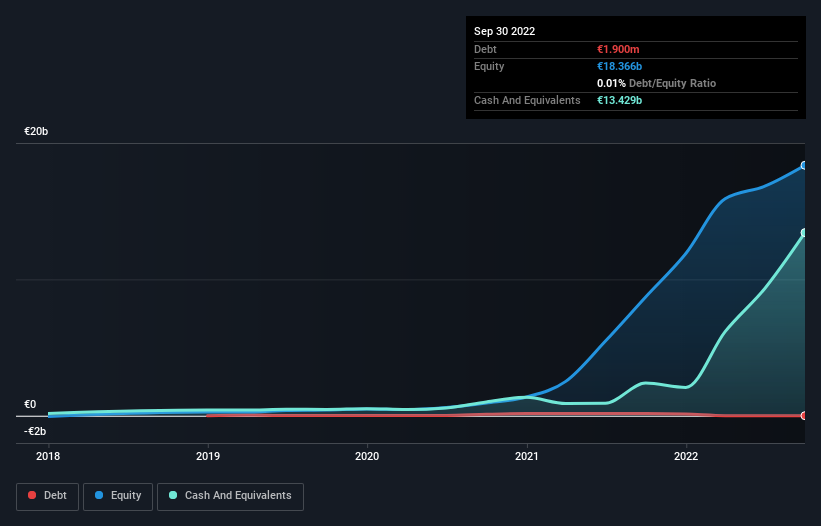- United States
- /
- Biotech
- /
- NasdaqGS:BNTX
These 4 Measures Indicate That BioNTech (NASDAQ:BNTX) Is Using Debt Safely

Howard Marks put it nicely when he said that, rather than worrying about share price volatility, 'The possibility of permanent loss is the risk I worry about... and every practical investor I know worries about.' So it might be obvious that you need to consider debt, when you think about how risky any given stock is, because too much debt can sink a company. We can see that BioNTech SE (NASDAQ:BNTX) does use debt in its business. But should shareholders be worried about its use of debt?
When Is Debt A Problem?
Generally speaking, debt only becomes a real problem when a company can't easily pay it off, either by raising capital or with its own cash flow. If things get really bad, the lenders can take control of the business. However, a more common (but still painful) scenario is that it has to raise new equity capital at a low price, thus permanently diluting shareholders. By replacing dilution, though, debt can be an extremely good tool for businesses that need capital to invest in growth at high rates of return. When we think about a company's use of debt, we first look at cash and debt together.
View our latest analysis for BioNTech
How Much Debt Does BioNTech Carry?
The image below, which you can click on for greater detail, shows that BioNTech had debt of €1.90m at the end of September 2022, a reduction from €157.5m over a year. However, its balance sheet shows it holds €13.4b in cash, so it actually has €13.4b net cash.

A Look At BioNTech's Liabilities
The latest balance sheet data shows that BioNTech had liabilities of €3.96b due within a year, and liabilities of €336.6m falling due after that. Offsetting this, it had €13.4b in cash and €7.31b in receivables that were due within 12 months. So it actually has €16.4b more liquid assets than total liabilities.
This surplus liquidity suggests that BioNTech's balance sheet could take a hit just as well as Homer Simpson's head can take a punch. Having regard to this fact, we think its balance sheet is as strong as an ox. Simply put, the fact that BioNTech has more cash than debt is arguably a good indication that it can manage its debt safely.
Also positive, BioNTech grew its EBIT by 22% in the last year, and that should make it easier to pay down debt, going forward. The balance sheet is clearly the area to focus on when you are analysing debt. But ultimately the future profitability of the business will decide if BioNTech can strengthen its balance sheet over time. So if you want to see what the professionals think, you might find this free report on analyst profit forecasts to be interesting.
But our final consideration is also important, because a company cannot pay debt with paper profits; it needs cold hard cash. BioNTech may have net cash on the balance sheet, but it is still interesting to look at how well the business converts its earnings before interest and tax (EBIT) to free cash flow, because that will influence both its need for, and its capacity to manage debt. Over the most recent two years, BioNTech recorded free cash flow worth 59% of its EBIT, which is around normal, given free cash flow excludes interest and tax. This free cash flow puts the company in a good position to pay down debt, when appropriate.
Summing Up
While it is always sensible to investigate a company's debt, in this case BioNTech has €13.4b in net cash and a decent-looking balance sheet. And it impressed us with its EBIT growth of 22% over the last year. When it comes to BioNTech's debt, we sufficiently relaxed that our mind turns to the jacuzzi. The balance sheet is clearly the area to focus on when you are analysing debt. However, not all investment risk resides within the balance sheet - far from it. Be aware that BioNTech is showing 1 warning sign in our investment analysis , you should know about...
If, after all that, you're more interested in a fast growing company with a rock-solid balance sheet, then check out our list of net cash growth stocks without delay.
Valuation is complex, but we're here to simplify it.
Discover if BioNTech might be undervalued or overvalued with our detailed analysis, featuring fair value estimates, potential risks, dividends, insider trades, and its financial condition.
Access Free AnalysisHave feedback on this article? Concerned about the content? Get in touch with us directly. Alternatively, email editorial-team (at) simplywallst.com.
This article by Simply Wall St is general in nature. We provide commentary based on historical data and analyst forecasts only using an unbiased methodology and our articles are not intended to be financial advice. It does not constitute a recommendation to buy or sell any stock, and does not take account of your objectives, or your financial situation. We aim to bring you long-term focused analysis driven by fundamental data. Note that our analysis may not factor in the latest price-sensitive company announcements or qualitative material. Simply Wall St has no position in any stocks mentioned.
About NasdaqGS:BNTX
BioNTech
A biotechnology company, develops and commercializes immunotherapies to treat cancer and infectious diseases in Germany.
Adequate balance sheet and overvalued.
Similar Companies
Market Insights
Community Narratives



